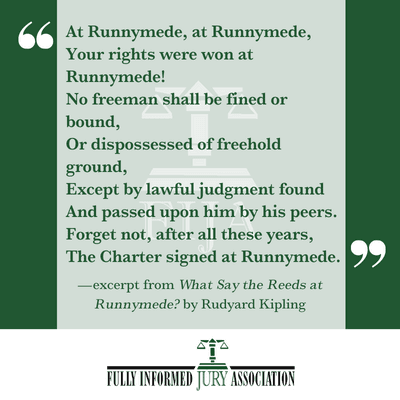The Reeds at Runnymede

The Reeds at Runnymede, written by Rudyard Kipling, is a poem about the Magna Carta. It was one of 23 Kipling poems included in A School History of England, first published in 1911. The text, by C.R.L. Fletcher and Rudyard Kipling, was "written for all boys and girls who are interested in the story of Great Britain and her Empire."
For those not familiar with the lay of the land, Runnymede is a meadow alongside the River Thames in England. It is the most likely location at which King John—faced with dozens of angry barons threatening war if he did not—first agreed in 1215 to the provisions of the Magna Carta.
This poem especially focuses on the famous clauses 39 and 40 in which our jury rights are grounded.
Clause 40 is poetically related in the first stanza. The Magna Carta Project translates this clause from the original Latin of the Magna Carta to modern English as “We will not sell, or deny, or delay right or justice to anyone.”
Clause 39 is echoed in the third stanza. The Magna Carta Project translates this passage as "No free man is to be arrested, or imprisoned, or disseised, or outlawed, or exiled, or in any other way ruined, nor will we go against him or send against him, except by the lawful judgment of his peers or by the law of the land."
You may wish to pay special attention for this language in the poem.
The Reeds at Runnymede
by Rudyard Kipling
At Runnymede, at Runnymede,
What say the reeds at Runnymede?
The lissom reeds that give and take,
That bend so far, but never break,
They keep the sleepy Thames awake
With tales of John at Runnymede.
At Runnymede, at Runnymede,
Oh, hear the reeds at Runnymede:
‘You musn’t sell, delay, deny,
A freeman’s right or liberty.
It wakes the stubborn Englishry,
We saw ’em roused at Runnymede!
When through our ranks the Barons came,
With little thought of praise or blame,
But resolute to play the game,
They lumbered up to Runnymede;
And there they launched in solid line
The first attack on Right Divine,
The curt uncompromising “Sign!’
They settled John at Runnymede.
At Runnymede, at Runnymede,
Your rights were won at Runnymede!
No freeman shall be fined or bound,
Or dispossessed of freehold ground,
Except by lawful judgment found
And passed upon him by his peers.
Forget not, after all these years,
The Charter signed at Runnymede.’
And still when mob or Monarch lays
Too rude a hand on English ways,
The whisper wakes, the shudder plays,
Across the reeds at Runnymede.
And Thames, that knows the moods of kings,
And crowds and priests and suchlike things,
Rolls deep and dreadful as he brings
Their warning down from Runnymede!
Source and Notes:
Background information on how the poem came to be written, including a photograph of the original manuscript penned by Kipling, is available from the British Library. More detailed background and notes on the text are available from The Kipling Society.
-
Estimated Convictions Obtained by Plea Bargain
97%
-
Extra Punishment for Refusing a Plea Deal
64%
-
Rank of U.S. in Incarceration
1
-
Years FIJA Has Fought for Jury Rights
36


